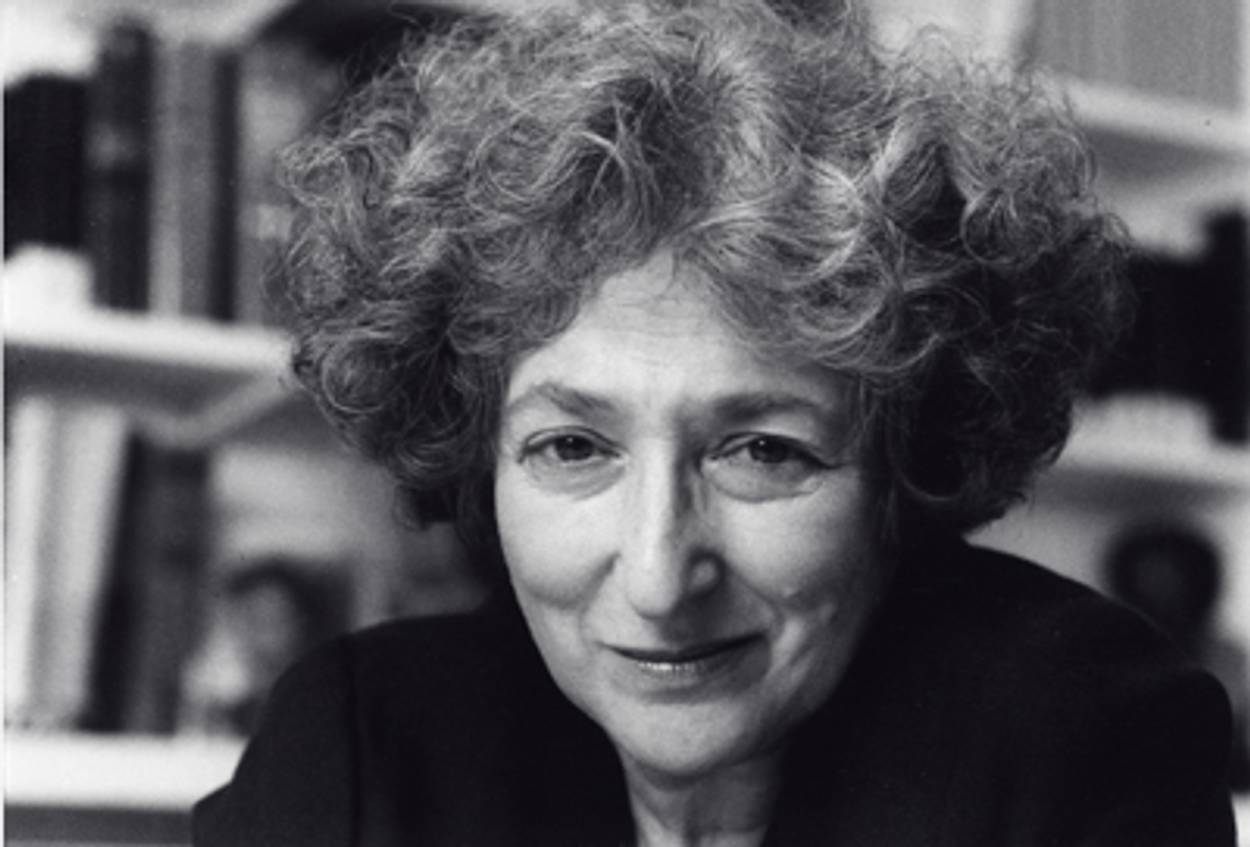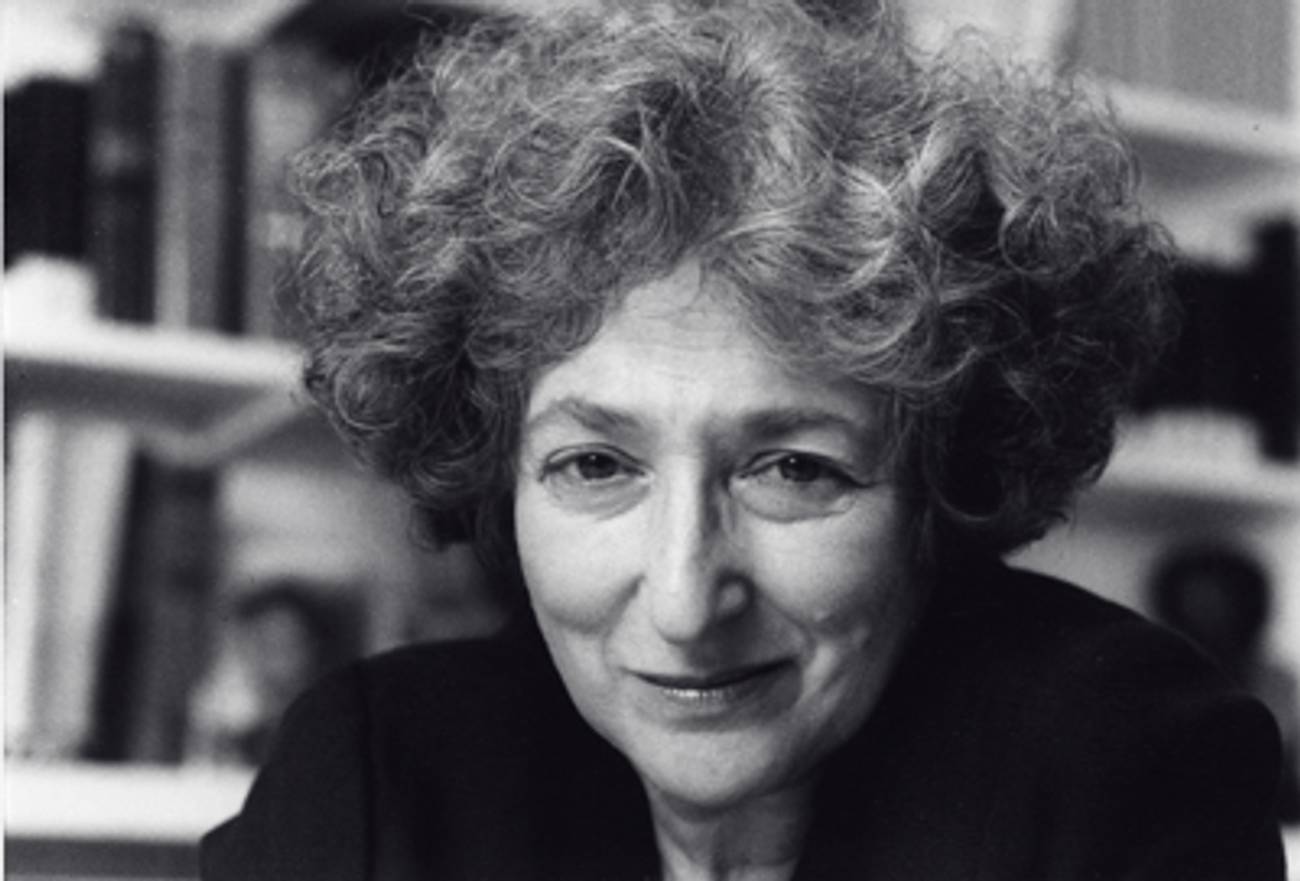Crimes and Misdemeanors
In Lore Segal’s fiction, no one is innocent




Born in Vienna in 1928, novelist, children’s author, and translator Lore Segal was on the first Kindertransport to England during World War II. Though separated from her family at the age of 10 and exposed to fear and loneliness in a foreign country, she was fortunate enough to have her parents join her later in London. But her parents’ lives as political refugees remained precarious. Her father, once an accountant, at first worked as a butler in England and was then interned in a Scottish prisoner-of-war camp because of his Austrian origins. He died before the war ended and Segal and her mother eventually made their way to New York.
In 1985 Segal wrote Her First American, her second novel for adults, and she found that tapping into her experience of pain allowed her to create disparate characters, united by their suffering; characters like Carter Bayoux, an alcoholic African American intellectual, and Ilka Weissnix, a young Jewish woman escaping Hitler’s Austria. In Shakespeare’s Kitchen, her recent collection of linked short stories, Ilka again appears as a protagonist. Now, decades after arriving in America—her last name anglicized to Weisz—she teaches English at the fictional Concordance Institute, a think tank in a quaint Connecticut town, where—because Segal is ever mindful of the presence of pain and disparity—it abuts a neglected housing project.
You often write about people’s reactions to sorrow and brutality. In your new book, some characters seem almost to long for sorrow and brutality. Fishgoppel, a Jewish American student of literature, relishes Ilka’s mother’s stories of life under Hitler in Austria. In Her First American, the white ex-wife of a black man likes to hear her father-in-law’s slave stories. How do you explain such an impulse?
I think we do like to hear about brutality. I’ve sometimes thought that the angriest Jews are the Americans who were not there, and Fishgoppel is one of those. She wants to hear about the brutality so she can bathe in the sorrow of it. One way to pacify the guilt of having failed to suffer is to deal in it, to listen to it. Such reactions are sympathetic—even if they’re not particularly useful.
What about you? Are you angry?
In a documentary about the Kindertransport—either My Knees Were Jumping or Into the Arms of Strangers—I hear myself answer that I “don’t have the anger gene.” Maybe. Or maybe it, the gene, is hiding out under the stratagem of seeing so many points of view.
How did your own experiences during the Holocaust influence your ideas about how people face pain?
My answer is the story in Shakespeare’s Kitchen, “The Reverse Bug.” I’m saying that we cannot—physically cannot—bear brutality when we are forced to hear the sounds it makes. How amazing that we are able to choose to not know that it exists, always, even while we eat and argue and love.
Unlike Her First American, Shakespeare’s Kitchen is focused much more on the politics of human relationships than on bigger issues like race and culture. Why did you shift to a narrower lens?
Well, there is a black neighborhood right next to the college in the book, but I think I said everything I could about the race question in the earlier novel. Our sense of the “other” in the neighborhood is not central to the story in this book. The question of the ongoing, permanent torture that goes on in the world, the black neighborhood being part of that—I did not want to write directly about that. But I did want to see what kind of a shadow those things represent in our ordinary, daily lives. I wanted to have my lovers make love, fall in love, to the sound of torture. Because, again, that’s what we do, whether we hear the torture or not.
At one point in the book, a crime wave disrupts the tranquility of campus life. Ilka’s coworkers discuss the possibility of erecting a wall to separate the college from the projects, which some presume is where the thieves and muggers are coming from. Why is this, a wall, the first solution your characters reach for? Can walls be effective measures for imposing peace?
There’s the Berlin Wall, the wall in Israel. A potential wall that would keep Mexicans out at the border with the United States. There are lots of walls being built. Are they good? Well, they keep certain people out. But do they solve the problem? No way. Either everybody will climb over it or eventually the wall will fall. The desire for a wall is understandable, though: If I thought there was an enemy out there who was trying to get my grandchildren, I’d put one up.
To go to back to the issue of crime in the book, the point is that everybody is implicated. Ilka committed a crime by walking out of a grocery store without paying for her roast beef. Even Leslie, the good guy, has somewhere in his youth done something that makes him blush. I wanted to spread the guilt for crime. If the black folks on the other side of the wall do it, so do we.
It’s true that everyone in the book seems guilty of some wrongdoing: Ilka sleeps with her friend’s husband. But her act is a complicated one. What’s going on there?
She’s behaving horribly. Yet, this horrible behavior is the source of her greatest happiness. That’s what a novel can do, show how those two things are possible at once. I want to be able to say two things at the same time and be terribly troubled that there is no resolution. To put that in another context: I’m always supposed to say whether I’m for the Palestinians or for the Israelis—but I have to be for both.
Ilka has a student whose father was a Nazi. He’s aggrieved by his father’s disappearance at a U.S. embassy in South America. Do you sympathize with him?
Yes, I do. Here’s an interesting question: Whether I throw you out of the window or you jump out, your body will be equally broken. Am I more sympathetic with you if you were thrown out? Yes. However, again, even if you’re responsible for the pain yourself, the body ends up equally broken, the blood is equally red. In the two cases, the suffering is the same. Isn’t that interesting and unmanageable?
That being said, can we absolve the Nazis for the pain they caused during the Holocaust simply because some of them also suffered?
Absolve the Nazis! God no. Hell no. The Israeli writer Aharon Appelfeld was asked why he always wrote about the victims. Why don’t you write about the perpetrators? “Because I don’t understand them,” he answered.
At one point in the book, the institute holds a symposium on genocide. As the symposium begins, a rabbi stands up in the audience and announces: “All killings are not murders; all murders are not genocides,” insinuating that the Holocaust was more horrific than contemporary genocides. What, to your mind, is the role of that rabbi in the scene?
I’m afraid I did want him to be a little bit of a comic character, because he’s preempting the conversation with Jewish concerns, which is what minorities do. Minorities that are not really comfortable will look for hurt, will look for slights. But, of course, his complaints are reasonable.
The symposium comes to a standstill when the sound system starts to blare eerie noises: recordings of concentration-camp victims screaming and wailing at Dachau, and the cries of the residents of Hiroshima. What made you decide to bring the conference to a close this way?
That’s a political question, and I have a political answer. This is the one case where I am propagandizing. I’m saying to my fellow Jews who say, “Why are we talking about this and that when the Holocaust was so terrible?” The Holocaust was so terrible—and a lot of other things are also terrible. Maybe less terrible, maybe minimally less terrible. Maybe more terrible. But oppression, torture, and genocide are what they are not because they’re done to the Jews only. No, the Holocaust is not the only horror that has happened. I wish to connect it with Hiroshima; I wish to connect it with a great many other outrages. Darfur is not the same as Abu Ghraib, but the two can be discussed in relation to each other.